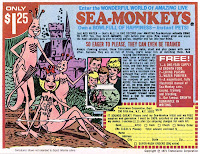 Growing up, my mother always exhorted us to eat our fruits and vegetables, or else we'd get Scurvy. Being an elementary-schooler, I didn't know that Scurvy was, in fact, a dietary deficiency in Vitamin C. Actually, the sum total of my understanding of the word was as part of the timeless (cartoon) pirate lingo: "You scurvy scallywag!" I think at one point I was convinced that not eating your vegetables would result in me becoming a pirate.
Growing up, my mother always exhorted us to eat our fruits and vegetables, or else we'd get Scurvy. Being an elementary-schooler, I didn't know that Scurvy was, in fact, a dietary deficiency in Vitamin C. Actually, the sum total of my understanding of the word was as part of the timeless (cartoon) pirate lingo: "You scurvy scallywag!" I think at one point I was convinced that not eating your vegetables would result in me becoming a pirate.The disease was, apparently, quite common among sailors and pirates in the seventeenth and eighteenth century, but the symptoms are quite a bit less pleasant than a charming West Country accent: spotted skin, spongy, bleeding gums, eventually leading to wholesale tooth loss, open pus-filled sores, immobility and death. Being a simple dietary deficiency, the disease could be cured by daily consumption of fruits or vegetables, especially citrus fruits (which were unfortunately, unavailable on long sea voyages).
One of the most common solutions to shipboard scurvy came as part of the solution to another unpleasant facet of life on board a ship: filthy, stagnant drinking water. As seawater was undrinkable, sailors and pirates needed to haul all of their fresh water with them, in wooden casks. Unfortunately, this stagnant water quickly grew algae and became filthy and unpalatable. Grog, a mixture of the stagnant water and rum, made the water more palatable (and avoided the predictable consequences of handing out straight rum to bored sailors and pirates). Eventually, the British Navy also added citrus juice (usually lime) to the mix, and unexpectedly, the problems with scurvy almost disappeared. This also led to the infamous derogatory epithet aimed at British sailors: "limey!"
Vitamin C deficiency is almost unknown in the animal kingdom: virtually all mammals can synthesize Vitamin C, and don't need to find it in the environment. Along with other primates, guinea pigs are virtually the only other mammal that does not synthesize their own L-ascorbic acid. Well, fruit bats, too. But I don't consider bats to be mammals. Instead I tend to think of them as horrible unearthly hellspawn that have no business existing at all. (So not an exact taxonomy as such.)
Serious cases of scurvy are all but unknown in the modern world, but apparently, a peculiar diet can lead to inadvertent self-imposed scurvy. So eat your fruits and vegetables. Yarr!








